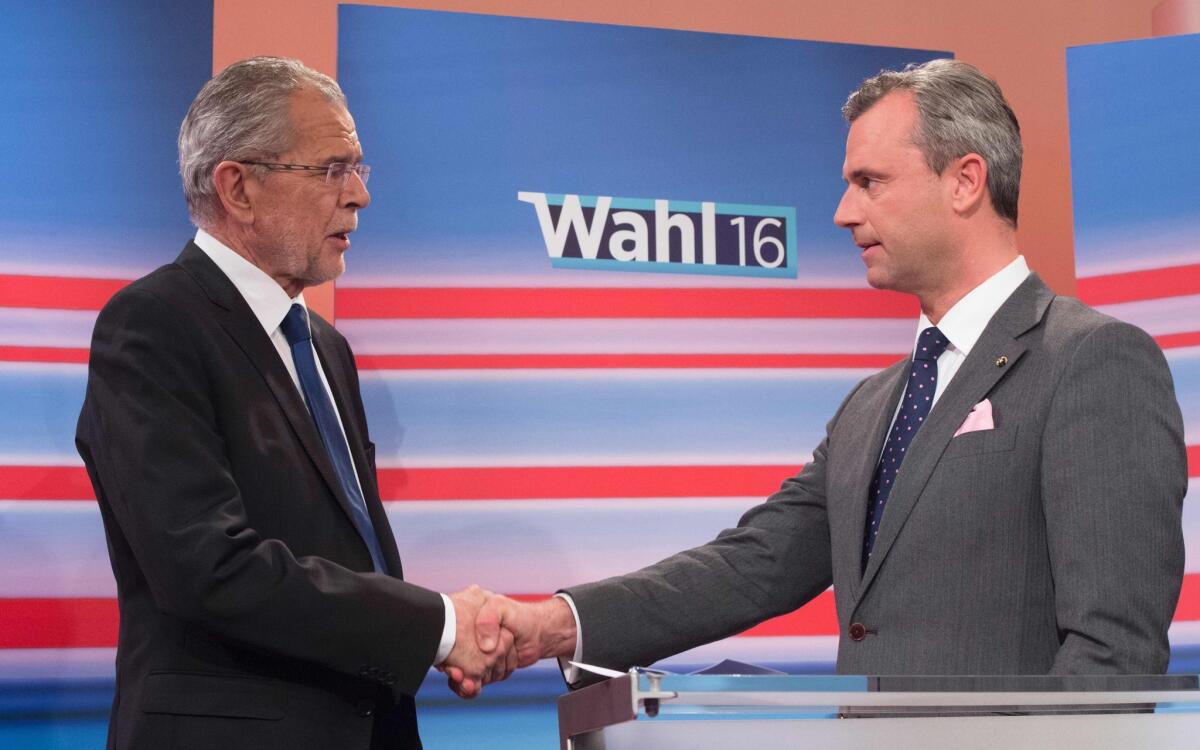Austria deadlocked as leftist and far-right presidential candidates await absentee votes

- Share via
Reporting from Berlin — Austria was split in half Sunday in a cliffhanger presidential election in which far-right candidate Norbert Hofer held a narrow lead over his left-wing challenger in a vote that will not be decided until nearly 1 million absentee ballots are counted Monday.
Hofer is a leader in the Freedom Party, which was founded by former Nazis in 1956, and is attempting to become the first far-right head of state in western Europe since World War II. He benefited from a backlash against immigrants and widespread frustration with Austria’s mainstream parties.
With nearly 5 million votes counted Sunday, he led by a scant 144,000. Analysts compared Hofer’s “Austria first” platform to the campaign run by U.S. Republican presidential candidate Donald Trump. Hofer is opposed to Muslims, refugees and trans-Atlantic trade agreements that he says are eliminating jobs in Austria, where unemployment has doubled to 10% in the last three years.
The election for the ceremonial office had drawn widespread international attention amid fears that the rise of Hofer and the far-right in Austria, which is often accused of whitewashing the country’s Nazi past, could pave the way for far-right parties in France, the Netherlands and elsewhere in Europe to take power.
But Hofer encountered strong opposition from Alexander Van der Bellen, 72, an economist who was the leader of the Greens party for 11 years, until 2008. Van der Bellen’s father was a Russian aristocrat who fled Stalinism and came to Vienna as a refugee. The son, who ran as an independent but with support from all other established parties, ran on a policy of open doors for refugees, as well as greater development of renewable energy.
The ORF public television network said the results were too close to call. The candidates appeared in a joint interview saying they did not expect a winner to be declared until Monday.
“I’ve never seen an election as close as this -- we’re going to have to wait until tomorrow,” Hofer told ORF. His campaign had appealed to fears that Austria has been overrun by foreigners after the coalition government let in some 90,000 refugees fleeing the war in Syria and turmoil in the Middle East.
“No matter who ends up winning this has to make sure that Austria is reunited,” Hofer added.
He rejected charges that his election could damage the image abroad of Austria, a land-locked Alpine country that relies heavily on foreign trade and tourism. He called media reports abroad that his election would be tantamount to Europe’s most dangerous lurch to the right since 1945 “completely absurd.”
“Anyone who looks at our party’s program and compares it to the Republicans in the United States will quickly see that we’re not a far-right party. I’m the center-right,” he said.
In his campaign, Hofer vowed to put “Austria first” and “stop the invasion of Muslims”. Exit polls found that Hofer was far ahead among men and voters without high school diplomas.
Hofer’s rise reflects rapid changes in Austria, a nation of 8.7 million people. The country has undergone a major shift to the right in the last year -- first welcoming more than 90,000 refugees fleeing war and poverty, then slamming its borders shut.
The ruling Social Democrats and their conservative People’s Party allies lost in the April 24 first round of voting, leading to a government upheaval this month in which Chancellor Werner Faymann abruptly resigned after more than seven years in power. A new chancellor, Christian Kern, the former chairman of the national railways, was sworn into office last week.
“A lot of voters are angry and in a foul mood,” Van der Bellen told ORF, adding that he was delighted with his showing after the first round, in which he got just 21% of the vote to Hofer’s 35%. “So few people gave me any chance a month ago after ending up some 14 percentage points behind. There weren’t many who thought that gap could be closed. There’s been such an incredible movement our way in the last 14 days,” he said.
Analysts expressed surprise that the race was so close, saying a heavy turnout in Vienna and other regions had helped Van der Bellen. They said fears a Hofer victory could lead to Austria being isolated in Europe had helped raise the turnout to above 70%.
“I’m surprised that Van der Bellen was able to catch Hofer,” said Dieter Segert, a political scientist at the University of Vienna, in an interview. “It shows that about half the country is worried about the Freedom Party and voted for the lesser of two evils.”
Kirschbaum is a special correspondent
ALSO
Taliban leader confirmed killed in U.S. airstrike as focus turns to his successor
‘Mohamed was a good pilot,’ father of EgyptAir captain says. ‘And he knows God’
As shadow of war fades, Obama visits a Vietnam focused on trade and better relations
Sign up for Essential California
The most important California stories and recommendations in your inbox every morning.
You may occasionally receive promotional content from the Los Angeles Times.



